ASU Law announces new faculty honors
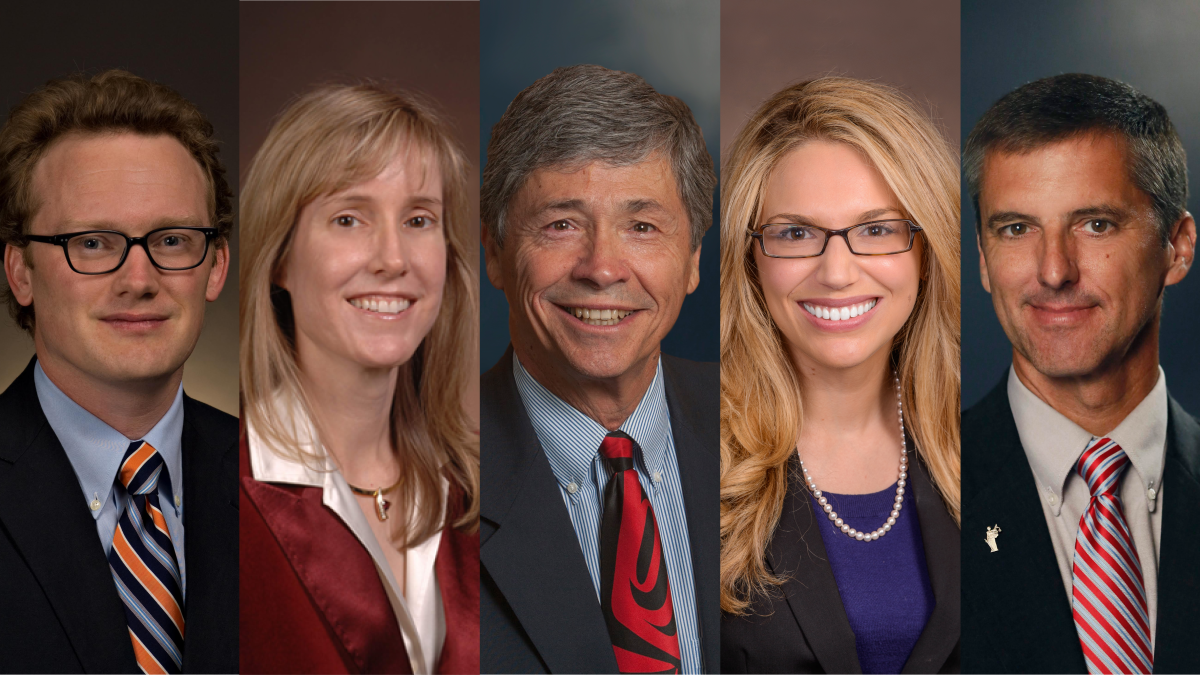
ASU Law announces new faculty honors with professorship appointments to (from left): Zack Gubler, Linda DeMaine, Robert Miller, Karen Bradshaw and James G. Hodge Jr.
A law school is only as strong as its faculty. At the Sandra Day O’Connor College of Law at Arizona State University, students learn from some of the nation’s foremost scholars and innovative legal instructors. They have played an integral role in ASU Law establishing itself as one of the highest ranked public law schools in the nation, a leading center of scholarly exchange with a tradition of exceptional bar passage and quality job-placement rates.
Among the notable faculty members are a distinguished group of honorees, newly listed as named chairs, professors, scholars or fellows, who bring a wealth of experience, diverse backgrounds and groundbreaking research to ASU Law.
“We are indebted to our generous donors for affording us the opportunity to recruit, retain and recognize the most talented legal minds in the world,” ASU Law Dean Douglas Sylvester said. “Our faculty are as hardworking as they are talented, producing groundbreaking legal research while making incredible contributions to our law school and the surrounding community.”
Among the most recent additions to the list are the Roslyn O. Silver Professor of Law, the Marie Selig Professor of Law and the Mary Sigler Distinguished Research Scholar.
The newest honorific appointments among the ASU Law faculty are:
Willard H. Pedrick Distinguished Research Scholar: Karen Bradshaw
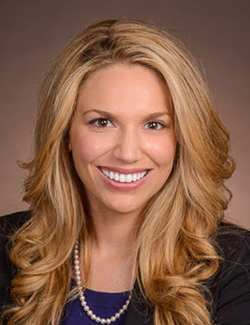
Karen Bradshaw, Willard H. Pedrick Distinguished Research Scholar
The Pedrick Scholarship is named for Willard H. Pedrick, the founding dean of ASU Law.
Professor Karen Bradshaw teaches environmental law and researches governance of natural resources, with an emphasis on emerging regulatory approaches including certification regimes, public-private partnerships and collaborative settlements. Bradshaw is also a faculty affiliate scholar with the Classical Liberal Institute at New York University School of Law and Senior Sustainability Scientist at the Global Institute of Sustainability at Arizona State University. She is an expert on wildfire law and has also written about land development and forest management.
“I am deeply honored by this distinction,” Bradshaw said. “The Pedrick Scholarship affords me additional latitude to pursue interesting research.”
Bradshaw received her JD with honors from the University of Chicago Law School, where she was a Tony Patino Fellow, Olin Fellow and comment editor for the University of Chicago Law Review. She clerked for Judge E. Grady Jolly of the U.S. Court of Appeals for the Fifth Circuit. Before joining the ASU Law faculty, Bradshaw was the inaugural Koch-Searle Fellow in Legal Studies at New York University School of Law.
Bradshaw has published more than a dozen articles in law and peer-reviewed journals. She is the author of the forthcoming book “The New Animal Rights: How Uncovering the Biological Origins of Property Can Save America's Wildlife” (University of Chicago Press) and editor of the book “Wildfire: Law & Economics Policy Perspectives” (with Dean Lueck) (Routledge, 2012). She has presented at workshops and conferences at Columbia University, New York University, University of Chicago, Oxford University and Yale University.
Roslyn O. Silver Professor of Law: Linda DeMaine
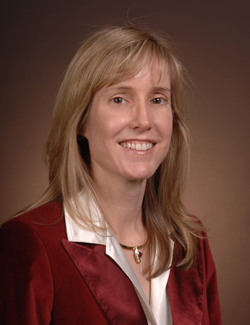
Linda Demaine, Roslyn O. Silver Professor of Law
This new professorship honors the Honorable Roslyn O. Silver, a senior judge with the United States District Court for the District of Arizona who graduated from ASU Law in 1971 and teaches at the school. She is the first alumna to have an ASU Law professorship in her name.
The inaugural Roslyn O. Silver Professorship was awarded to Professor Linda Demaine. Demaine’s research and teaching at the law school focuses on issues at the intersection of law and psychology.
After receiving her JD and PhD in psychology, Demaine was a behavioral scientist and policy analyst at RAND, where she worked on projects including the prevalence and content of arbitration clauses in consumer contracts, the law and psychology of deception in defense of national computer systems, the use of the military for domestic civil law enforcement, and government issuance of patents on genes and other modified products of nature. Demaine has held an American Psychological Association Congressional Fellowship, through which she worked with the Senate Judiciary Committee on FBI and Department of Justice oversight, judicial nominations, and legislation. She also has held an American Psychological Association Science Policy Fellowship, working with the CIA’s Behavioral Sciences Unit.
“I’m honored to be the inaugural Roslyn O. Silver Professor of Law,” Demaine said. “With this title, I will strive to embody several of the admirable qualities for which Judge Silver is widely known — her deep-seated compassion, her dedication to fairness, her commitment to mentoring and her ability to bring her dog to work. The law school community and I greatly appreciate Judge Silver’s generous support.”
Marie Selig Professor of Law: Zack Gubler
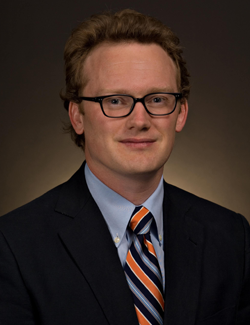
Zack Gubler, Marie Selig Professor of Law
The Marie Selig professorship was established to honor the mother of former Major League Baseball Commissioner Bud Selig, who serves as a Distinguished Professor of Sports in America at ASU Law. The inaugural Marie Selig Professorship was awarded to Professor Zachary Gubler, whose research interests lie in the areas of corporate law and financial and securities regulation.
“It is a great privilege to be named the Marie Selig Professor of Law," Gubler said. "This professorship is a moving tribute to Commissioner Selig’s mother, who was an educator, and I commit to do my best to always be deserving of such an honor. The influence that the Selig family’s generosity will have on ASU Law is shaping up to be as great as the influence that Commissioner Selig had on baseball, which of course landed him in the Hall of Fame.”
Gubler joined the ASU law faculty in 2011 after having spent two years at Harvard Law School as a Climenko Fellow. Prior to joining the academy, Gubler served as a law clerk to Judge Richard C. Wesley of the U.S. Court of Appeals for the Second Circuit.
Peter Kiewit Foundation Professor of Law: James G. Hodge Jr.
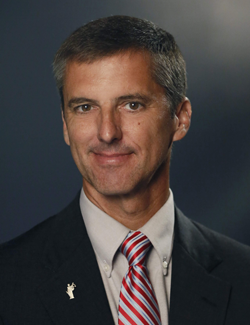
James G. Hodge Jr., Peter Kiewit Foundation Professor of Law
The Nebraska-based Peter Kiewit Foundation, established in 1979, honors philanthropist Peter Kiewit of the Kiewit Corporation, one of the largest construction and engineering companies in North America.
Professor James G. Hodge Jr., who joined ASU Law in 2009, is the director of ASU’s Center for Public Health Law and Policy. Through scholarship, teaching and applied projects, Hodge delves into multiple areas of health law, public health law, global health law, ethics and human rights. Since 2010, he has also served as director of the Western Region Office of the Network for Public Health Law, funded by the Robert Wood Johnson Foundation. Since its inception, the office has assisted lawyers, health officials, practitioners, students and others nationally on over 3,300 claims.
“I am deeply honored to be named the Peter Kiewit Foundation Professor of Law,” Hodge said. “The foundation has a rich history of funding and overseeing projects and interests for the benefit of communities across the United States. Its interests are at the heart of my own work to improve health across populations through effective laws and policies. When Dean Sylvester notified me of my selection for this professorship, I reflected on the wonderful commitment that ASU Law has made to our collective work in public health law and policy. As we celebrate the 10th anniversary of our Center for Public Health Law and Policy, I am grateful to collaborate with elite faculty and students at ASU Law and nationally, committed, like the foundation, to the role of communities in society.”
Hodge is a prolific scholar, having published more than 200 articles in journals of law, medicine, public health and bioethics; two books in public health law; 25 book chapters; and guest edited four symposium issues in the Journal of Law, Medicine, and Ethics, Jurimetrics and the Annals of Health Law. He is regularly ranked among the top 3% of cited authors in the Social Science Research Network.
Willard H. Pedrick Distinguished Research Scholar: Robert Miller
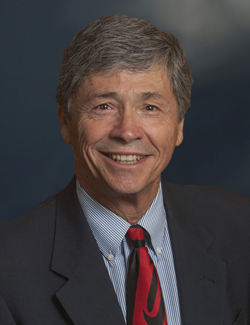
Robert Miller, Willard H. Pedrick Distinguished Research Scholar
The Pedrick Scholarship is named for Willard H. Pedrick, the founding dean of ASU Law.
Professor Robert J. Miller joined ASU Law in 2013. His areas of expertise are federal Indian law, American Indians and international law, American Indian economic development, Native American natural resources and civil procedure. He is an enrolled citizen of the Eastern Shawnee Tribe.
"I was surprised and very delighted to hear that I was appointed a Willard H. Pedrick Distinguished Research Scholar by my dean and faculty,” Miller said. “It is especially satisfying to be honored in this fashion by the colleagues that I work with on a daily basis."
Before joining ASU Law, Miller was on the faculty of Lewis & Clark Law School from 1999 to 2013. Prior to his career in academia, he practiced Indian law with Hobbs, Straus, Dean & Walker, and practiced litigation for the Stoel Rives law firm. Following graduation from law school, he clerked for Judge Diarmuid O’Scannlain of the U.S. Court of Appeals for the Ninth Circuit.
Miller’s scholarly works include articles, books and book chapters on a wide array of federal Indian law issues and civil procedure, and he speaks regularly on Indian law issues across the U.S. and in other countries.
He has written "Reservation 'Capitalism:' Economic Development in Indian Country" (Praeger 2012) and "Native America, Discovered and Conquered: Thomas Jefferson, Lewis & Clark, and Manifest Destiny" (Praeger 2006); and has co-authored "Creating Private Sector Economies in Native America: Sustainable Development Through Entrepreneurship" (Cambridge University Press 2019) and "Discovering Indigenous Lands: The Doctrine of Discovery in the English Colonies" (Oxford University Press 2010).
More Law, journalism and politics
Spring break trip to Hawaiʻi provides insight into Indigenous law
A group of Arizona State University law students spent a week in Hawaiʻi for spring break. And while they did take in some of the…

LA journalists and officials gather to connect and salute fire coverage
Recognition of Los Angeles-area media coverage of the region’s January wildfires was the primary message as hundreds gathered at…

A new twist on fantasy sports brought on by ASU ties
A new fantasy sports gaming app is taking traditional fantasy sports and mixing them with a strategic, territory-based twist.…

